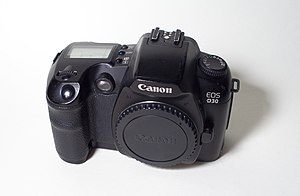Canon EOS D30: Difference between revisions
No edit summary |
|||
| Line 31: | Line 31: | ||
The '''Canon EOS D30''' is a discontinued 3.1-[[megapixel]] professional [[digital single lens reflex camera]] (DSLR) body, initially announced by [[Canon Inc.|Canon]] on May 17, 2000. It is part of the [[Canon EOS]] line of cameras and uses the [[Canon EF lens mount|EF lens mount]]. The EOS D30 was Canon's first "home grown" digital SLR.<ref name=ires>{{cite web|url=http://www.imaging-resource.com/PRODS/D30/D30A.HTM|title=Canon EOS D30 Digital SLR|date=August 27, 2000|publisher=imaging-resource.com|accessdate=19 November 2009}}</ref> Before that point Canon had a contract with [[Eastman Kodak|Kodak]] to rebrand the Kodak 2-megapixel DCS 520 as [[Canon EOS D2000]] and the 6-megapixel DCS 560 as Canon EOS D6000 digital SLRs, which combined Kodak digital backs and Canon camera bodies.<ref name=digi>{{cite web|url=http://www.steves-digicams.com/d30.html|title=Canon EOS D30|date=October 27, 2000|publisher=Steves Digicams|accessdate=19 November 2009}}</ref> |
The '''Canon EOS D30''' is a discontinued 3.1-[[megapixel]] professional [[digital single lens reflex camera]] (DSLR) body, initially announced by [[Canon Inc.|Canon]] on May 17, 2000. It is part of the [[Canon EOS]] line of cameras and uses the [[Canon EF lens mount|EF lens mount]]. The EOS D30 was Canon's first "home grown" digital SLR.<ref name=ires>{{cite web|url=http://www.imaging-resource.com/PRODS/D30/D30A.HTM|title=Canon EOS D30 Digital SLR|date=August 27, 2000|publisher=imaging-resource.com|accessdate=19 November 2009}}</ref> Before that point Canon had a contract with [[Eastman Kodak|Kodak]] to rebrand the Kodak 2-megapixel DCS 520 as [[Canon EOS D2000]] and the 6-megapixel DCS 560 as Canon EOS D6000 digital SLRs, which combined Kodak digital backs and Canon camera bodies.<ref name=digi>{{cite web|url=http://www.steves-digicams.com/d30.html|title=Canon EOS D30|date=October 27, 2000|publisher=Steves Digicams|accessdate=19 November 2009}}</ref> |
||
The D30 was aimed at the |
The D30 was aimed at the enthusiast market, and was intended to occupy the gap between the high-end consumer-market Canon PowerShot Pro70, and Canon's first ''professional'' digital SLR, the [[Canon EOS-1D]],{{citation needed|date=November 2009}} which was released in November 2001.<ref>{{cite web|url=http://www.dpreview.com/reviews/canond30/|title=Canon EOS-D30 Review|last=Askey|first=Phil|date=October 2000|publisher=dpreview.com|accessdate=19 November 2009}}</ref> |
||
The D30 was succeeded by the 6.3-megapixel [[Canon EOS D60|D60]] in 2002. |
The D30 was succeeded by the 6.3-megapixel [[Canon EOS D60|D60]] in 2002. |
||
Revision as of 02:15, 13 November 2015
 | |
| Overview | |
|---|---|
| Type | Single-lens reflex |
| Lens | |
| Lens | Interchangeable (EF) |
| Sensor/medium | |
| Sensor | CMOS |
| Maximum resolution | 2,160 x 1,440 (3.1 megapixels) |
| Film speed | 100-1600 in 1 EV steps |
| Storage media | CompactFlash(CF) (Type I or Type II) and MicroDrive(MD) |
| Focusing | |
| Focus modes | One-shot, AI-Servo, AI-Focus, Manual |
| Focus areas | 3 points (1 + 1) |
| Focus bracketing | none |
| Exposure/metering | |
| Exposure modes | Full auto, programmed, shutter-priority, aperture priority, manual |
| Exposure metering | TTL, full aperture, zones |
| Metering modes | Evaluative, Center Weighted, Average |
| Flash | |
| Flash | built-in, pop-up |
| Flash bracketing | none |
| Shutter | |
| Shutter | electronic focal plane |
| Shutter speed range | 30 to 1/4000 s |
| Continuous shooting | up to 3.0 frame/s, max 8 frames |
| Viewfinder | |
| Viewfinder | Optical |
| Image processing | |
| White balance | 7 presets, including Auto and custom |
| WB bracketing | none |
| General | |
| LCD screen | 1.8 in (46 mm), 114,000 pixels |
| Battery | Li-Ion BP-511 rechargeable |
| Optional battery packs | BP-511A, BG-ED3 battery grip |
| Weight | 780 g (body only) |
| Made in | Japan |
The Canon EOS D30 is a discontinued 3.1-megapixel professional digital single lens reflex camera (DSLR) body, initially announced by Canon on May 17, 2000. It is part of the Canon EOS line of cameras and uses the EF lens mount. The EOS D30 was Canon's first "home grown" digital SLR.[1] Before that point Canon had a contract with Kodak to rebrand the Kodak 2-megapixel DCS 520 as Canon EOS D2000 and the 6-megapixel DCS 560 as Canon EOS D6000 digital SLRs, which combined Kodak digital backs and Canon camera bodies.[2]
The D30 was aimed at the enthusiast market, and was intended to occupy the gap between the high-end consumer-market Canon PowerShot Pro70, and Canon's first professional digital SLR, the Canon EOS-1D,[citation needed] which was released in November 2001.[3]
The D30 was succeeded by the 6.3-megapixel D60 in 2002.
Features
- 22.7 x 15.1 mm CMOS sensor (APS-C)
- 3.1 megapixel effective (3.3 megapixel total)
- Max resolution 2160 x 1440
- FOV crop (1.6x)
- Canon EF lens mount (excludes EF-S)
- 3-point auto focus
- 100, 200, 400, 800, 1600 ISO speed equivalent
- 30 to 1/8000 s shutter speed and bulb
- TTL 35 zone SPC metering: evaluative, center weighted, partial
- Exposure compensation -2 EV to +2 EV in 1/3 EV or 1/2 EV steps
- Auto White Balance (plus 5 positions & manual preset)
- Eye-level pentaprism viewfinder
- 1.8 in (46 mm) color TFT liquid-crystal monitor
- E-TTL flash mode
- Built-in Flash
- 3 frames per second continuous shooting (max. 8 frames)
- Dimensions (WxHxD): 150 x 107 x 75 mm
- Weight (body only): 780 g
- Optional BG-ED3 battery grip
References
- ^ "Canon EOS D30 Digital SLR". imaging-resource.com. August 27, 2000. Retrieved 19 November 2009.
- ^ "Canon EOS D30". Steves Digicams. October 27, 2000. Retrieved 19 November 2009.
- ^ Askey, Phil (October 2000). "Canon EOS-D30 Review". dpreview.com. Retrieved 19 November 2009.
External links
![]() Media related to Canon EOS D30 at Wikimedia Commons
Media related to Canon EOS D30 at Wikimedia Commons
